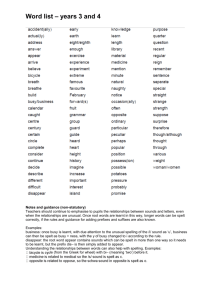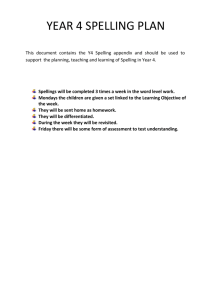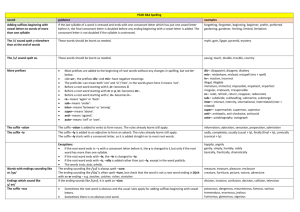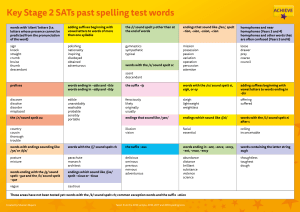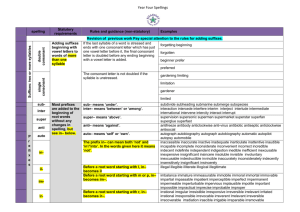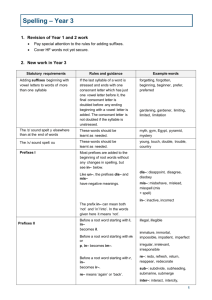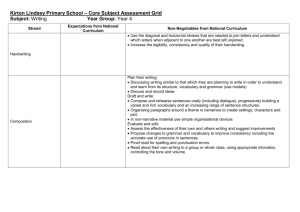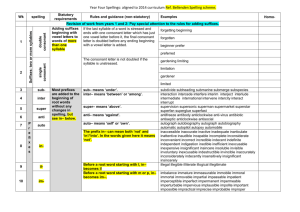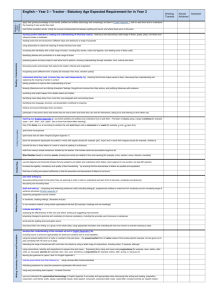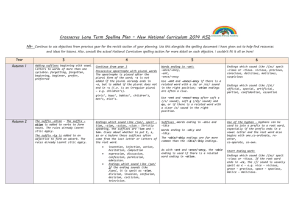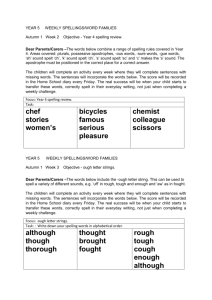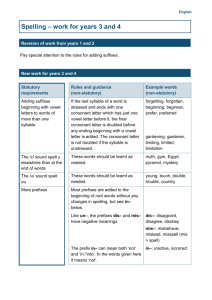Year 3 and 4
advertisement
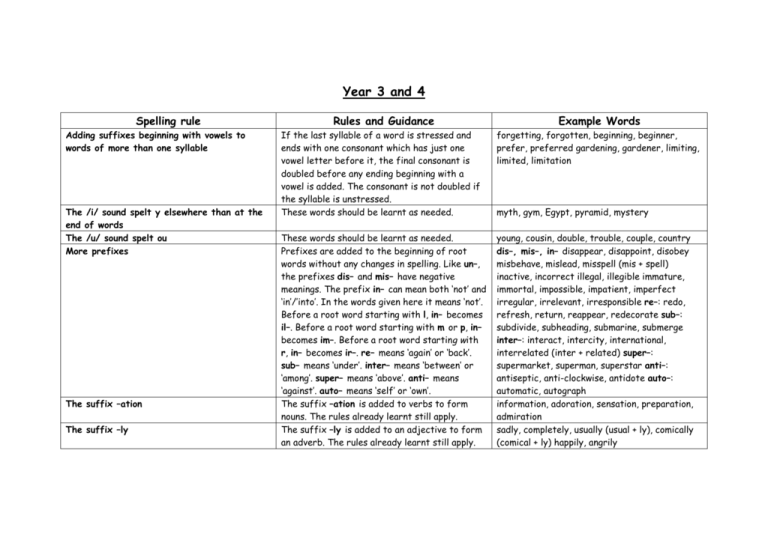
Year 3 and 4 Spelling rule Adding suffixes beginning with vowels to words of more than one syllable The /i/ sound spelt y elsewhere than at the end of words The /u/ sound spelt ou More prefixes The suffix –ation The suffix –ly Rules and Guidance Example Words If the last syllable of a word is stressed and ends with one consonant which has just one vowel letter before it, the final consonant is doubled before any ending beginning with a vowel is added. The consonant is not doubled if the syllable is unstressed. These words should be learnt as needed. forgetting, forgotten, beginning, beginner, prefer, preferred gardening, gardener, limiting, limited, limitation These words should be learnt as needed. Prefixes are added to the beginning of root words without any changes in spelling. Like un–, the prefixes dis– and mis– have negative meanings. The prefix in– can mean both ‘not’ and ‘in’/’into’. In the words given here it means ‘not’. Before a root word starting with l, in– becomes il–. Before a root word starting with m or p, in– becomes im–. Before a root word starting with r, in– becomes ir–. re– means ‘again’ or ‘back’. sub– means ‘under’. inter– means ‘between’ or ‘among’. super– means ‘above’. anti– means ‘against’. auto– means ‘self’ or ‘own’. The suffix –ation is added to verbs to form nouns. The rules already learnt still apply. The suffix –ly is added to an adjective to form an adverb. The rules already learnt still apply. young, cousin, double, trouble, couple, country dis–, mis–, in– disappear, disappoint, disobey misbehave, mislead, misspell (mis + spell) inactive, incorrect illegal, illegible immature, immortal, impossible, impatient, imperfect irregular, irrelevant, irresponsible re–: redo, refresh, return, reappear, redecorate sub–: subdivide, subheading, submarine, submerge inter–: interact, intercity, international, interrelated (inter + related) super–: supermarket, superman, superstar anti–: antiseptic, anti-clockwise, antidote auto–: automatic, autograph information, adoration, sensation, preparation, admiration sadly, completely, usually (usual + ly), comically (comical + ly) happily, angrily myth, gym, Egypt, pyramid, mystery Words with endings sounding like /zhuh/ or /chuh/ Endings which sound like /zhun/ The suffix –ous Endings which sound like /shun/, spelt –tion, – sion, –ssion, –cian The –ly suffix starts with a consonant, so it is added straight on to most root words unless they end with y. If the root word ends with y, the y is changed to i. Exceptions: 1. If the root word ends with –le, the –le is changed to –ly. 2. If the root word ends with – ic, –ally is added rather than just –ly, except in the word publicly. 3. The words truly, duly, wholly. gently, simply, humbly, nobly basically, frantically, dramatically The ending sounding like /zhuh/ is always spelt –sure. The ending sounding like /chuh/ is often spelt –ture, but check that the word is not a root word ending in (t)ch with an –er ending, e.g. teacher, catcher, richer, stretcher. If the ending sounds like /zhun/, it is spelt as – sion. Sometimes the root word is obvious and the usual rules apply for adding suffixes beginning with vowels. Sometimes there is no obvious root word. –our is changed to –or before –ous is added. A final ‘e’ must be kept if the /j/ sound of ‘g’ is to be kept. If there is an /i/ sound before the –ous ending, it is usually spelt as i, but a few words have e (e.g. spontaneous, hideous, piteous). Strictly speaking, the endings are –ion and –ian. Clues about whether to put t, s, ss or c before these endings often come from the last letter measure, treasure, pleasure, enclosure picture, adventure, creature, furniture, departure, mixture division, invasion, confusion, decision, collision, television poisonous, dangerous, mountainous, nervous, famous, various, tremendous, enormous, obvious, pompous, previous, ravenous humorous, glamorous, vigorous courageous, outrageous serious, previous, obvious, furious, envious invention, inflation, injection, action, completion, exception expression, discussion, confession, permission, transmission, admission expansion, or letters of the root word. –tion is the most common spelling. It is used if the root word ends in t (invent) or te (inflate). –ssion is used if the root word ends in ss (express) or –mit (permit). –sion is used if the root word ends in d or se (Exceptions: attend – attention; intend – intention) –cian is used if the root word ends in c or cs (e.g. music – musician, politics – politician). extension, comprehension, tension musician, electrician, politician, magician, mathematician Words with the /k/ sound spelt ch (Greek in origin) school, chorus, chemist, Christmas, character, anchor Words with the /sh/ sound spelt ch (mostly French in origin) chef, chalet, machine, brochure, champagne, chauffeur Words ending with the /g/ sound spelt –gue and the /k/ sound spelt –que (French in origin) league, tongue, synagogue, antique, unique, mosque Words with the /s/ sound spelt sc (Latin in origin) Words with the /ai/ sound spelt ei, eigh, or ey The Romans probably pronounced the sc in the Latin words from which these words come as /sk/, so mentally pronouncing these words that way may help with spelling – e.g. the pronunciation /skene/ can be used when learning to spell scene. science, scene, scissors, muscle, disciple, fascinate vein, weigh, eight, neighbour, they, obey Possessive apostrophe with plural words The apostrophe is placed after the plural form of the word; s is not added if the plural already ends in s, but is added if the plural does not end in s (i.e. is an irregular plural, e.g. children’s). Homophones or near-homophones Words to be learnt accident, advertise, approve, benefit, behave, bicycle, breath, breathe, building, calendar, certain, concentrate, chocolate, congratulate, conscience, continue, decorate, describe, dictionary, difficult, discover, disturb, early, earn, earth, educate, excite, experience, experiment, explore, extreme, February, grammar, guide, guard, half, heart, immediate, improve, increase, independent, injure, inquire, interest, island, junior, knowledge, library, material, medicine, mention, multiply, murmur, nephew, occasion, often, opposite, paragraph, particular, peculiar, position, possess, produce, professor, promise, property, prove, punctuate, quality, quantity, quarrel, quarter, recite, recover, register, regular, reign, remember, sentence, separate, sew, situate, strength, girls’, boys’, babies’, children’s, men’s, mice’s (Note: singular proper nouns ending in an ‘s’ use the ’s notation e.g. Cyprus’s population) accept/except, affect/effect, ball/bawl, berry/bury, brake/break, fair/fare, grate/great, groan/grown, here/hear, heel/heal/he’ll, knot/not, mail/male, main/mane, meat/meet, medal/meddle, missed/mist, peace/piece, plain/plane, rain/rein, scene/seen Many root words need to be learnt, but once they are learnt, and the rules and guidelines for adding prefixes and suffixes are known, many long words can be spelt correctly. Understanding relationships between words can help with spelling. A few examples: conscience is related to science – both come from the Latin word meaning ‘to know’. bicycle is cycle (from the Greek for wheel) with bi– (meaning two) before it. medicine is related to medical. opposite is related to oppose, so the schwa sound in opposite is spelt as o. regular sounds as if it might end in the letters –er, but the clear /a/ in the related word regularity shows that regular must end with the letters ar. sufficient, sure, surprise, surround, thought, through, though, weary Words which are often misspelt when prefixes or suffixes are added If these words are thought of in terms of root words and the rules for adding prefixes and suffixes are then applied, the words are less likely to be misspelt. disappear (just add dis to appear) disappoint (just add dis to appoint) beginning (double the n at the end of begin to keep the short /i/ sound before it) business (busy + ness, with the y of busy changed to i according to the rule) necessary, unnecessary (just add un to necessary) necessarily (add ly, changing the y of necessary to I according to the rule)
